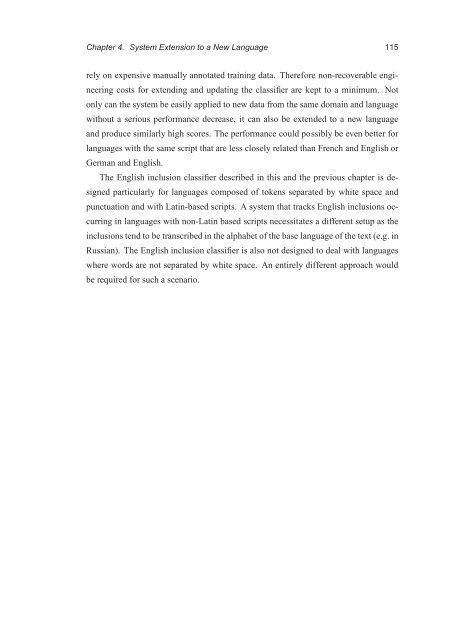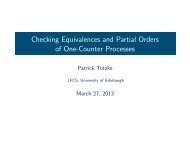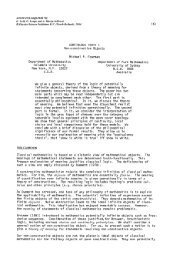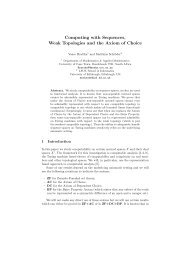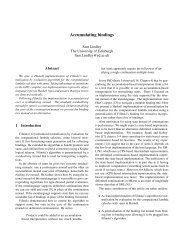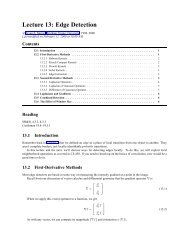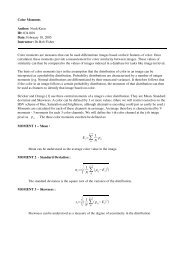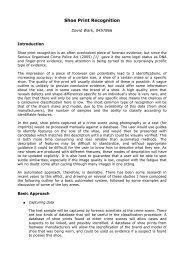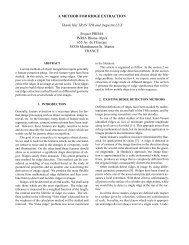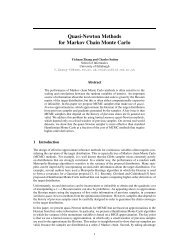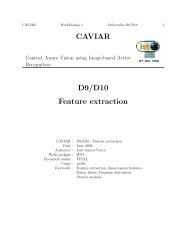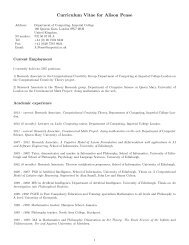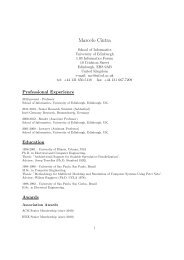- Page 1 and 2:
Automatic Detection of English Incl
- Page 3 and 4:
these parsers with the annotation-f
- Page 5 and 6:
Declaration I declare that this the
- Page 7 and 8:
3.3.5 Post-processing Module . . .
- Page 9 and 10:
A.2.2 Kappa Coefficient . . . . . .
- Page 11 and 12:
5.6 Average relative token frequenc
- Page 13 and 14:
3.16 Most frequent English inclusio
- Page 15 and 16:
Chapter 1. Introduction 2 siderable
- Page 17 and 18:
Chapter 1. Introduction 4 Chapter 3
- Page 19 and 20:
Chapter 1. Introduction 6 1.1 Relat
- Page 21 and 22:
Chapter 2. Background and Theory 8
- Page 23 and 24:
Chapter 2. Background and Theory 10
- Page 25 and 26:
Chapter 2. Background and Theory 12
- Page 27 and 28:
Chapter 2. Background and Theory 14
- Page 29 and 30:
Chapter 2. Background and Theory 16
- Page 31 and 32:
Chapter 2. Background and Theory 18
- Page 33 and 34:
Chapter 2. Background and Theory 20
- Page 35 and 36:
Chapter 2. Background and Theory 22
- Page 37 and 38:
Chapter 2. Background and Theory 24
- Page 39 and 40:
Chapter 2. Background and Theory 26
- Page 41 and 42:
Chapter 2. Background and Theory 28
- Page 43 and 44:
Chapter 2. Background and Theory 30
- Page 45 and 46:
Chapter 2. Background and Theory 32
- Page 47 and 48:
Chapter 2. Background and Theory 34
- Page 49 and 50:
Chapter 2. Background and Theory 36
- Page 51 and 52:
Chapter 2. Background and Theory 38
- Page 53 and 54:
Chapter 2. Background and Theory 40
- Page 55 and 56:
Chapter 2. Background and Theory 42
- Page 57 and 58:
Chapter 2. Background and Theory 44
- Page 59 and 60:
Chapter 3 Tracking English Inclusio
- Page 61 and 62:
Chapter 3. Tracking English Inclusi
- Page 63 and 64:
Chapter 3. Tracking English Inclusi
- Page 65 and 66:
Chapter 3. Tracking English Inclusi
- Page 67 and 68:
Chapter 3. Tracking English Inclusi
- Page 69 and 70:
Chapter 3. Tracking English Inclusi
- Page 71 and 72:
Chapter 3. Tracking English Inclusi
- Page 73 and 74:
Chapter 3. Tracking English Inclusi
- Page 75 and 76:
Chapter 3. Tracking English Inclusi
- Page 77 and 78: Chapter 3. Tracking English Inclusi
- Page 79 and 80: Chapter 3. Tracking English Inclusi
- Page 81 and 82: Chapter 3. Tracking English Inclusi
- Page 83 and 84: Chapter 3. Tracking English Inclusi
- Page 85 and 86: Chapter 3. Tracking English Inclusi
- Page 87 and 88: Chapter 3. Tracking English Inclusi
- Page 89 and 90: Chapter 3. Tracking English Inclusi
- Page 91 and 92: Chapter 3. Tracking English Inclusi
- Page 93 and 94: Chapter 3. Tracking English Inclusi
- Page 95 and 96: Chapter 3. Tracking English Inclusi
- Page 97 and 98: Chapter 3. Tracking English Inclusi
- Page 99 and 100: Chapter 3. Tracking English Inclusi
- Page 101 and 102: Chapter 3. Tracking English Inclusi
- Page 103 and 104: Chapter 3. Tracking English Inclusi
- Page 105 and 106: Chapter 3. Tracking English Inclusi
- Page 107 and 108: Chapter 3. Tracking English Inclusi
- Page 109 and 110: Chapter 3. Tracking English Inclusi
- Page 111 and 112: Chapter 3. Tracking English Inclusi
- Page 113 and 114: Chapter 4 System Extension to a New
- Page 115 and 116: Chapter 4. System Extension to a Ne
- Page 117 and 118: Chapter 4. System Extension to a Ne
- Page 119 and 120: Chapter 4. System Extension to a Ne
- Page 121 and 122: Chapter 4. System Extension to a Ne
- Page 123 and 124: Chapter 4. System Extension to a Ne
- Page 125 and 126: Chapter 4. System Extension to a Ne
- Page 127: Chapter 4. System Extension to a Ne
- Page 131 and 132: Chapter 5. Parsing English Inclusio
- Page 133 and 134: Chapter 5. Parsing English Inclusio
- Page 135 and 136: Chapter 5. Parsing English Inclusio
- Page 137 and 138: Chapter 5. Parsing English Inclusio
- Page 139 and 140: Chapter 5. Parsing English Inclusio
- Page 141 and 142: Chapter 5. Parsing English Inclusio
- Page 143 and 144: Chapter 5. Parsing English Inclusio
- Page 145 and 146: Chapter 5. Parsing English Inclusio
- Page 147 and 148: Chapter 5. Parsing English Inclusio
- Page 149 and 150: Chapter 5. Parsing English Inclusio
- Page 151 and 152: Chapter 5. Parsing English Inclusio
- Page 153 and 154: Chapter 5. Parsing English Inclusio
- Page 155 and 156: Chapter 5. Parsing English Inclusio
- Page 157 and 158: Chapter 5. Parsing English Inclusio
- Page 159 and 160: Chapter 6 Other Potential Applicati
- Page 161 and 162: Chapter 6. Other Potential Applicat
- Page 163 and 164: Chapter 6. Other Potential Applicat
- Page 165 and 166: Chapter 6. Other Potential Applicat
- Page 167 and 168: Chapter 6. Other Potential Applicat
- Page 169 and 170: Chapter 6. Other Potential Applicat
- Page 171 and 172: Chapter 6. Other Potential Applicat
- Page 173 and 174: Chapter 6. Other Potential Applicat
- Page 175 and 176: Chapter 6. Other Potential Applicat
- Page 177 and 178: Chapter 6. Other Potential Applicat
- Page 179 and 180:
Chapter 6. Other Potential Applicat
- Page 181 and 182:
Chapter 6. Other Potential Applicat
- Page 183 and 184:
Chapter 6. Other Potential Applicat
- Page 185 and 186:
Chapter 6. Other Potential Applicat
- Page 187 and 188:
Chapter 7 Conclusions and Future Wo
- Page 189 and 190:
Chapter 7. Conclusions and Future W
- Page 191 and 192:
Appendix A. Evaluation Metrics and
- Page 193 and 194:
Appendix A. Evaluation Metrics and
- Page 195 and 196:
Appendix A. Evaluation Metrics and
- Page 197 and 198:
Appendix A. Evaluation Metrics and
- Page 199 and 200:
Appendix B. Guidelines for Annotati
- Page 201 and 202:
Appendix B. Guidelines for Annotati
- Page 203 and 204:
Appendix B. Guidelines for Annotati
- Page 205 and 206:
Appendix C TIGER Tags and Labels C.
- Page 207 and 208:
Appendix C. TIGER Tags and Labels 1
- Page 209 and 210:
Appendix C. TIGER Tags and Labels 1
- Page 211 and 212:
Bibliography 198 Andersen, G. (2005
- Page 213 and 214:
Bibliography 200 Bresnan, J. (2001)
- Page 215 and 216:
Bibliography 202 Damashek, M. (1995
- Page 217 and 218:
Bibliography 204 Finkel, J., Dingar
- Page 219 and 220:
Bibliography 206 Hachey, B., Alex,
- Page 221 and 222:
Bibliography 208 Kirkness, A. (1984
- Page 223 and 224:
Bibliography 210 and Technology (In
- Page 225 and 226:
Bibliography 212 Poplack, S. (1988)
- Page 227 and 228:
Bibliography 214 Sokol, D. K. (2000
- Page 229:
Bibliography 216 Yang, W. (1990). A


